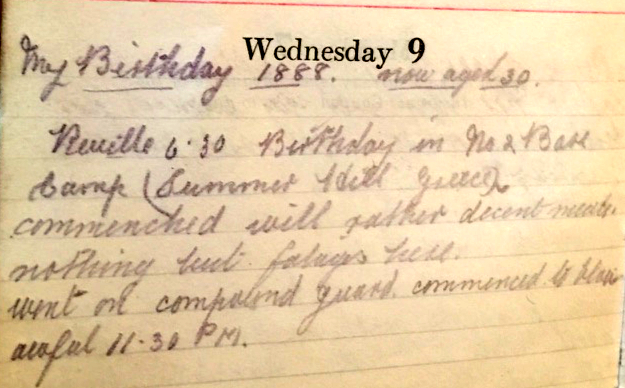Wednesday Jan 9th, 1918
My birthday, born 1888, now aged 30.
Reveille 6:30. Birthday in No 2 Battalion Camp (Summer Hill, Greece). Commenced with rather decent meals – nothing but fatigues here. Went on compound guard. Commenced to blow, awful 11:30pm.
Happy Birthday Frank
Frank was born 130 years ago today in Shaw in Lancashire. 1888 was the year that the Football League was formed and when Jack the Ripper terrorized the East End of London. It was also the year that TE Lawrence, Thomas Sopwith, J Arthur Rank and John Logie Baird were born.

During the first thirty years of Frank’s life Britain would solidify and expand its status as a mighty industrialized and trading nation. Victoria, Queen since 1837 and the last of Britain’s Hanoverian monarchs, held dominion over a third of the world’s population.
A short run down of British military action from 1888 to 1914 shows us the reach and ambitions of the Empire at this time. Conflicts were fought in Sudan, Tibet, China, Zanzibar, Nigeria and South Africa.
Success in these colonial ventures varied: From the victories of the Madhi war within which the much lauded Battle of Omdurman (1898) took place, to the costly Second Boer War (1899-1902) where Britain lost over 22,000 men and faced justified international criticism due to its ‘scorched earth’ tactics and harsh use of concentration camps.
The British Army
Experiences of these constant, relatively small-scale, colonial campaigns had a strong impact upon the organisation of British military forces. Pre-World War I Britain had the largest professional, volunteer army in the world though it was relatively small compared to other conscripted forces. It was, however, relatively well equipped and trained and designed to be deployed anywhere in the world.
World War I presented a very different type of warfare and much of Britain’s professional army was squandered in its early months. The Boer War had shown the British the ferocious power of artillery and modern rifles and that had been in a conflict where they faced only 88,000 men. In WWI the German Army alone numbered 3.7 million men and all sides were equipped with the latest military technology. Consequently in 1918 Frank, like millions of other soldiers before him, will experience the horror of industrialized warfare.
However, for today Frank is relatively safe. His birthday though starts with fatigues. ‘Fatigues’ was the term used for the non-combat work carried out by soldiers. As such, it could be anything from digging trenches or disposing of bombs to peeling potatoes and emptying latrines. After Frank’s fatigue duty he is sent on guard duty – surely a cold and windy job at Summer Hill. What a grim way to round out a milestone birthday!
References and Further Reading
Has History Misjudged the Generals of World War One, BBC, Accessed (08/01/2018)


